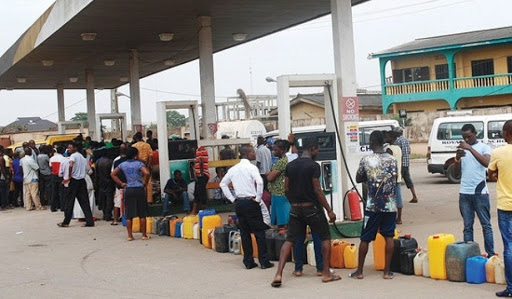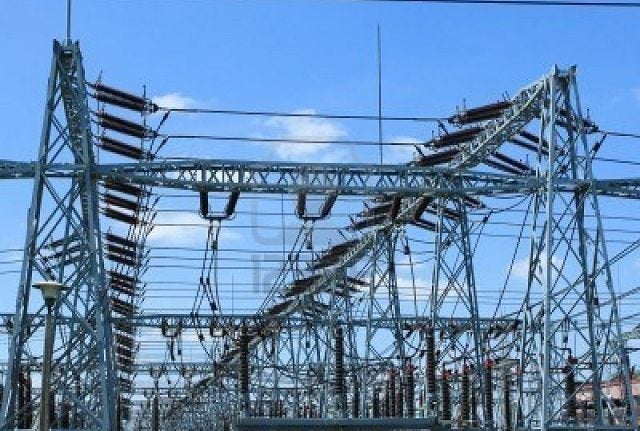President Muhammadu Buhari has on Monday disclosed that the current administration move to remove subsidy in petrol was to end the visible queues witnessed by Nigerians in filling stations across the nation.
He also stated that it would be economically dangerous for Nigeria to go back to the era of fuel subsidy because of its grave financial cost
President Buhari disclosed this while declaring open the First Year Ministerial Performance Review Retreat for Ministers, Permanent Secretaries and Top Government Functionaries, at the State House Conference Centre (Old Banquet Hall) Abuja.
He said that the outbreak of COVID-19 pandemic has affected economies globally and has compelled the government to make some far-reaching adjustments that may cause some initial pain, but which was necessary for long-term gains.
According to him, “As you all know, when oil prices collapsed at the height of the global lockdown, we deregulated the price of premium motor spirit (PMS) such that the benefit of lower prices was passed to consumers. This was welcome by all and sundry.
“The effect of regulation though is that PMS prices will change with changes in global oil prices. This means, quite regrettably, that as oil prices recover, we would see some increases in PMS prices.
“There are several negative consequences if the Government should resume the business of fixing or subsidizing PMS prices. First of all, it would mean a return to the costly subsidy regime.
READ ALSO: Petrol Price: MOMAN list benefits of PMS deregulation to Nigerians
“Today we have 60 per cent less revenues, we just cannot afford the cost. The second danger is the potential return of fuel queues – which has, thankfully, become a thing of the past under this administration. Nigerians no longer have to endure long queues just to buy petrol, often at highly inflated prices.
He said contrary to insinuations that his administration was insensitive by hiking fuel price and electricity tariffs at the same time, the two episodes were a mere coincidence.
President Buhari, who was represented by Vice-President Yemi Osinbajo, said in view of the subsidy removal, fuel price will continue to rise as the cost of crude oil recovers in the international market.
He, however, assured that the government would not allow independent marketers to take advantage of the situation by arbitrarily hiking petrol price.
Recall that the Buhari’s administration has come under attack since last week when the pump price of petrol went up again, rising from N148 per litre to about N162.
The price hike was induced by the jacking up of ex-depot price of petrol from N138 to N151.
According to the president, the current hike in fuel price is not a fresh development, but rather a product of deregulation of downstream petroleum sector earlier in the year following the drastic fall in the prices of petroleum products in the international market caused by the negative impact of COVID-19 on global economy.
He said petrol subsidy had to be done away with because there was no allocation for it in the revised 2020 budget in view of the necessity to make meaningful allocations for health, education and other social services.
“Also, as I hinted earlier, there is no provision for fuel subsidy in the revised 2020 budget, simply because we are not able to afford it, if reasonable provisions must be made for health, education and other social services. We now have no choice,” he said.
However, the president said the government would be alive to its responsibilities by ensuring that oil marketers do not take advantage of the development to arbitrarily increase the pump price of petrol.
READ ALSO: Nigeria heading towards full deregulation of Petrol – MOMAN
He further said that the Petroleum Products Pricing and Regulatory Agency (PPPRA) had provided a price ceiling that marketers must not exceed adding that with the deregulation of the oil sector, the coast is clear for more marketers to enter into the market.
Besides, President Buhari said that with more entrants into the market, competition will increase that will kindle the law of supply and demand that will eventually force down the price of petrol.
He said: “Nevertheless, I want to assure our compatriots that Government will remain alert to its responsibilities. The role of government now is to prevent marketers from raising prices arbitrarily or exploiting citizens. This was why the PPRA made the announcement a few days ago setting the range of price that must not be exceeded by marketers.
“The advantage we now have is that anyone can bring in petroleum products and compete with marketers, that way the price of petrol will be keep coming down.
“The other painful adjustment that we have had to make in recent days is a review of the electricity tariff regime. If there is one thing that we have heard over and over again, it is that Nigerians want consistent and reliable power supply.
“So the power sector remains a critical priority for the administration. Protecting the poor and vulnerable, while ensuring improved service in the power sector, is also a major priority for Government. And our policies, like the social investment programmes and other socio-economic schemes to benefit Nigerians, show that we remain focused on improving the welfare of the common man.”
Speaking on the recent electricity tariff hike, President Buhari said he had been unhappy over the poor state of electricity service supply to Nigerians for many years.
He acknowledged that the hike would be coming with discomfort, adding that the administration had directed that consumers who fall within poor and vulnerable category be protected as the tariff adjustment would only affect those with higher consumption.
According to him, government had taken due notice of the prevalent complaints of arbitrary estimated billings by electricity distribution companies (DISCOs) and has directed that a mass metering programme be initiated to correct the menace of estimated billing.
He said, “The other painful adjustment that we have had to make in recent days is a review of the electricity tariff regime. If there is one thing that we have heard over and over again, it is that Nigerians want consistent and reliable power supply. So the power sector remains a critical priority for the administration.
“Protecting the poor and vulnerable, while ensuring improved service in the power sector, is also a major priority for Government. And our policies, like the social investment programmes and other socio-economic schemes to benefit Nigerians, show that we remain focused on improving the welfare of the common man.
“The recent service-based tariff adjustment by the Discos has been a source of concern for many of us. Let me say frankly that like many Nigerians I have been very unhappy about the quality of service given by the Discos.
“That is why we have directed that tariff adjustments be made only on the basis of guaranteed improvement in service.
“Under this new arrangement only customers who are guaranteed a minimum of 12hours of power and above can have their tariffs adjusted. Those who get less than 12 hours supply (Band D and E Customers) will not see any tariff adjustment.
“The poor and under privileged who were on R1 lifeline tariffs in the old structure will be maintained on lifeline tariffs, meaning that they will experience no increase.
“Government has also taken notice of the complaints about arbitrary estimated billing. Accordingly, a mass metering program is being undertaken to provide meters for over 5 million Nigerians, largely driven by preferred procurement from local manufacturers – creating thousands of jobs in the process.
“NERC has also been instructed to strictly enforce the capping regulation which will ensure that unmetered customers are not charged beyond the metered customers in their neighbourhood”, he said.
The Nigerian leader said beyond the efforts being made to improve reliable and stable power supply through the conventional national grid source, the federal government, through the recently initiated Economic Sustainability Plan (ESP), is working on electrifying five million homes, which are not connected to the national grid, through the solar home systems.
He explained that the innovation has more than just giving light to the homes of more than 25 million Nigerians, but would also provide job opportunities to around 300,000 persons.
He said, “In addressing the power problems we must not forget that most Nigerians are not even connected to electricity at all. So, as part of the Economic Sustainability Plan, we are providing Solar home systems to 5 million Nigerian households (impacting up to 25 million individual Nigerians) in the next 12 months.
“We have already begun the process of providing financing support through the CBN for manufacturers and retailers of Off-Grid Solar Home Systems and Mini-Grids who are to provide the systems.
“The Five million systems under the ESP’s Solar Power Strategy will produce 250,000 jobs and impact up to 25 million beneficiaries through the installation. This means that more Nigerians will have access to electricity via a reliable and sustainable solar system.
“The support to Solar Home System manufacturers and the bulk procurement of local meters will create over 300,000 local jobs while ensuring that we set Nigeria on a path to full electrification.
“The tariff review is not about the increase, which will only affect the top electricity consumers, but establishing a system which will definitely lead to improved service for all at a fair and reasonable price.”






